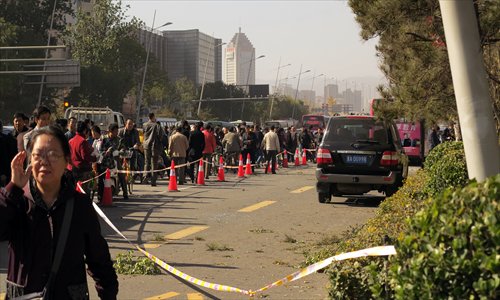Serial blasts shake Taiyuan

Pedestrians and vehicles draw along a street on Wednesday morning as police cordoned off the site of a series of explosions by homemade bombs near the provincial Party office buildings in Taiyuan, Shanxi Province. The blasts killed one and injured eight. Photo: IC
A series of explosions - caused by homemade bombs - outside a provincial office of the Communist Party of China in the northern Shanxi Province on Wednesday killed one person and wounded eight others, police said.
The explosions occurred at around 7:40 am in Taiyuan, the provincial capital. The police in Shanxi described the bombs as "small explosives" but did not reveal how many were used in the blasts.
According to the Xinhua News Agency, a local police bomb squad that went to the scene after the blasts did not recover more explosives. Steel beads and circuit boards that were found scattered on the ground led the police to believe that they were crude bombs.
An investigation is under-way but no lead was available, an officer with the publicity section of the provincial public security department told the Global Times.
Wednesday's explosions that occurred days ahead of a key plenary session of the Central Committee of the Communist Party of China drew nationwide attention in the wake of a terrorist strike at Tiananmen Square last week.
At the time of going to press, there was no indication that Wednesday's serial blasts involved terrorism.
Traffic at the site in Taiyuan resumed three hours after the blasts but some places were secured by the police until the afternoon, local residents said.
China Central Television reported on its official Sina Weibo account that the bombs blew up next to a bed of flowers near a gate of the Party building, damaging at least 20 vehicles parked nearby.
The Beijing-based The Mirror paper said the first bomb went off near the gate of a petition office in the compound and the series of blasts lasted for an hour.
There are different accounts on the number of detonations.
Xinhua quoted a resident living in a building opposite the provincial Party office as saying that seven blasts were heard.
A Global Times reporter saw a big hole in the door of a shop near a gate of the building which seemed to have resulted from the blasts. The shop's attendants said that they had heard six loud sounds and saw a person fall to the ground.
A local eyewitness to one of the explosions near the provincial Party office said she had heard four "loud blasts" from her apartment before she rushed to the street and heard another.
A man who didn't reveal his name told the Global Times that when a bomb went off, he was driving by the gate of the Party office and immediately saw white smoke billowing from his car. After he stopped the car, he found a crack in the windshield.
At the site, the Global Times reporter saw scattered steel beads, the diameter of which was over 50 millimeters. The beads battered glasses of vehicles and stop signs nearby.
Recent years have seen a number of attacks on government offices and public facilities, which some analysts say point to some people's anger with local authorities other grievances.
In May 2012, a blast at a housing demolition office in Qiaojia county, Yunnan Province claimed four lives and injured 16 others.
In June this year, a bus in Xiamen, Fujian Province burst into flames, leaving 47 dead and 34 injured. Police blamed Chen Shuizong, a petitioner who died in the fire.
The killing of innocent people drew public condemnation. But some point to deeper root causes.
"People's dissatisfaction toward the reality is surging, while the authorities exert more effort in maintaining stability, which leaves few outlets for public discontent," said Liu Kaiming, director of the Institute of Contemporary Observation, adding that the solution is to be responsive.